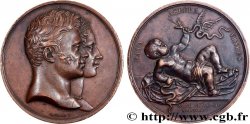正面
正面的文字 HENRI IV - LOUIS XVIII.
正面的说明书 Bustes accolés à droite ; en-dessous, signature GAYRARD F..
背面
背面的文字 A. NOS / FIDÈLES. SUJETS / POUR. AVOIR / SPONTANÉMENT / ET. DE. LEURS. DENIERS / RÉTABLI. LA. STATUE / DE. NOTRE. VI. AÏEUL / HENRI. IV.
背面的说明书 Inscription dans le champ, en huit lignes.
评论
历史细节
LOUIS XVIII
(04/06/1814-09/16/1824)
Louis-Stanislas-Xavier was born in Versailles in 1755 from the union of Dauphin Louis (son of Louis XV) and Marie-Josèphe Louise de Savoie. He first received the title of Count of Provence and was called Monsieur when his older brother, Louis XVI, became king in 1774.. Married to Louise Marie-Joséphine de Savoie in 1771, he had no children. Often in opposition to the Court, he did not initially condemn the movement of 1789 but the evolution of events decided him to leave Paris in the company of his wife, the very day of Louis XVI's flight to Varennes, but by another way. Refugee in Koblenz with his brother, the Count of Artois, he took the title of regent after the execution of Louis XVI then, on the death of his nephew Louis XVII, that of king. He began to work on the restoration despite the weak support at his disposal and had to change residence several times in the face of the victories of the Revolution and of Bonaparte.. With the First Empire, the monarchical cause seemed hopeless and Louis XVIII settled in England in a period of exile and financial embarrassment.. During the first defeats of Napoleon I, Louis XVIII resumed his diplomatic activity which, on the initiative of Talleyrand and thanks to English support, enabled him to return to France in May 1814.. Forced to flee to Ghent during the Hundred Days, Louis XVIII, during the second Restoration, tried to carry out the same policy of reconciliation as that defined on his first return to France.. After the White Terror (execution of Marshal Ney), the regime softened and fell asleep. Duke Decazes replaces Richelieu from 1818. Despite royalist pressure, Louis XVIII strongly supported the moderate policy of Decazes in the early years. France is reintegrated into the concert of Nations after the Congress of Aix-la-Chapelle. Occupation forces leave France. The law on censorship is relaxed in 1819. That year, Géricault presented the Raft of the Medusa. The policy of conciliation ceases after the assassination of the Duke of Berry on February 13, 1820 by Louvel. Overwhelmed by the reaction of the ultras after this assassination, Decazes resigned on February 20 and the Duke of Richelieu was recalled, thus marking the triumph of the right for the end of the reign and for the following reign.. The child of the miracle, Henri, Duke of Bordeaux, posthumous son of Charles Duke of Berry and Marie-Caroline de Bourbon, was born on September 29, 1820. Napoleon I died in Saint Helena on May 5, 1821.. Villele replaces Richelieu on December 14, 1821. The end of the reign is marked by the expedition to Spain, commanded by the Duke of Angoulême, organized in order to restore Ferdinand VII, driven out by the liberals. The French took Madrid on May 23, Fort Trocadéro on August 31, and Cadiz on September 30, 1823.. Louis XVIII, ill and crippled (gout), died September 16, 1824. He is buried in Saint-Denis on September 23.










 对产品描述纠错
对产品描述纠错 打印
打印 分享我的选择
分享我的选择 提问
提问 Consign / sell
Consign / sell
 产品介绍
产品介绍












